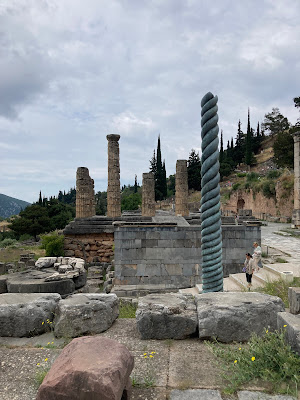The Temple of Pythian Apollo at Delphi on Mt. Parnassus was one of the great sites of the Ancient Greek world. In mythology, the god Apollo killed a great serpent there (traditionally the male serpent, or Python). The site became known as a place where Apollo would grant prophecies through his pythia (Female high priest). Delphi as a site was mentioned in The Illiad (circa 800 B.C.), so its history as a site of worship was long established. by the time we reach Classical Greece.
Ascending from the port of Krisa, one would make one's way through olive groves (still extant) to the the side of Mt. Parnassus where, at certain times of the year, questions could be asked of the god Apollo through his priestess. One would walk what was called The Sacred Way, past statues of renowned men, through the buildings erected by cities known as Treasuries where offerings were kept and displayed to show their devotion to the god, to the temple of Apollo. There, one would ask the question of the Pythia as she sat above a fissure in the earth where fumes from the decaying body of the Python would continually seep up (we now know these as hydrocarbon natural gasses from the earth; it is thought that they caused the priestess to enter a transcendent state and hear the god's response.). Above the temple was a amphitheater and a stadium for plays and sporting events in honor of the god.
The heyday of the complex was the Ancient and Classical Ages of Greece; in 278 B.C. it was destroyed by Thracian tribesman and never fully recovered, except for a brief renaissance under Hadrian in the Second Century A.D. (Also, it is noted that due to earthquakes, the gas emanation may have decreased or been eliminated thus "denuding" the oracle of her powers). It was eventually converted into more of Christian use during the Byzantine era.
A painting of Delphi as it would have appeared at its height:
(Source)
A stone from the entrance. I show this because as can be clearly seen, this is Greek. At least 2300 years later, this is writing that can still be read. Even dead, they still speak.
This would have been the location of stalls, or possibly some of the statues.
The stones are so large, and in many ways fit so closely together. We will see this at Mycenae as well.
The amount of work to quarry and move these stones - up a mountain - was tremendous.
Ruins of a city Treasury:
The Treasury of Athens. This is the one structure reconstructed at Delphi. It is said that the spoils taken from the Greek victory at Marathon in 490 B.C. from the Persians were displayed here.
Looking upwards towards the Temple of Apollo:
This bronze object (the original was moved to Byzantium) was created to memorialize the victory of the Greeks over the Persians at the Battle of Platea in 479 B.C. (I got bonus points from our tour guide for knowing this.)















I wonder how often your tour guide passes out bonus points for knowing that!
ReplyDeleteThe stonework is particularly fascinating here. All of those huge stones were dried in after being shaped for an exact fit. Amazing.
Leigh, I got the impression it was not many times.
DeleteThis ancient stonework was impressive to me as well. The amount of work involved for that kind of fit is, well, staggering.
Delphi, man that brings back memories of an Ancient Civ class at university, amazing how Man can alter the side of a mountain...by hand. Those various stone masons had talent TB.
ReplyDeleteNylon12, one reads of such things of course and even sees pictures, but to actually walk the same streets as those Ancient Greeks was quite a thing.
DeleteThe masonry...well, they built to last and for glory.
Did the Persians get screwed somehow and thus the unique bronze sculpture?
ReplyDeleteYes Ed, it was the defeat of the remainder of the force that had invaded Greece in 480 B.C. Following the naval loss at Salamis, Xerxes returned home but left troops in Greece to continue the conquest. The original sculpture was made from the spoils.
DeleteLove those Pics thank you!!! PP
ReplyDeleteYou are welcome PP! I think this would qualify as one of the highlights of the trip for me.
Delete